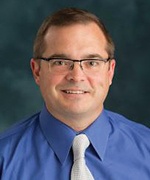NEXUS NEWS
The Importance of Mobility Education: A Q&A with Jim Sayer, PHD
July 6, 2020
by Tom Lemoine

Jim Sayer, PhD is the director of the University of Michigan Transportation Research Institute (UMTRI) and lead faculty of Foundations of Mobility, Nexus’ newest online professional certificate. Foundations of Mobility explores the latest thinking and research on connected transportation systems, autonomous vehicle design, and other transportation technologies in the context of their economic, social, and policy implications.
In this Q&A, we sat down with Dr. Sayer to discuss how this program came about, the importance of mobility education, and why this program is the first of its kind.
HOW DO YOU DEFINE MOBILITY?
Dr. Sayer: There are several ways that people define mobility, but we refer to it as the movement of people, goods, and services. When referring to moving people, we include all forms of transportation, including walking. For goods, we mean finished products as well as raw materials. When we say services, it includes things such as in-home medical care, mobile pet grooming, carpet cleaning, and so on. Mobility goes beyond what we traditionally think of as transportation. For people with mobility limitations, the first challenge may just be getting across the threshold of their home and down stairs, or dealing with sidewalks under construction. Are there safe and affordable means of transportation available? What are the implications of operating a vehicle from a safety, legal, and infrastructure perspective?
WHERE DO YOU SEE MOBILITY HEADING IN THE NEXT FEW YEARS? IN WHAT AREA ARE THINGS CHANGING MOST RAPIDLY?
Dr. Sayer: I think that many of the biggest changes will be associated with new business models for what we traditionally think of as transportation, things like shared vehicle usage and insurance based on miles travelled. But we will also see significant changes towards vehicle electrification, and away from gasoline and diesel fuel usage. We will also see new forms of mobility becoming available. Just five years ago, who would have thought that e-scooters and e-bikes would be available? I also believe that in addition to ground vehicle automation, we will begin to see increasing amounts of automation in commercial aircraft and aerial personable mobility.
WHY IS MOBILITY EDUCATION SO IMPORTANT?
Dr. Sayer: So many of us are trained to work in one small area of the overall mobility system. We’re engineers that design automobile parts, manage roadway infrastructure and traffic control in our community, or maybe oversee the logistics of getting goods from one place to another. These are all elements of a much larger mobility system, pieces of a very complex puzzle. But very few people think about the larger role of what they do from the perspective of the larger mobility system. We need to expand the way we think of mobility in terms of not only what affects ourselves, but how the way we move affects the overall system.
HOW DOES FOUNDATIONS OF MOBILITY FIT INTO THE EMERGING TREND OF CONTINUING EDUCATION AND ONLINE LEARNING?
Dr. Sayer: Because there are many changes taking place in the way goods are moved and services are delivered, many concepts we may have previously learned may no longer be valid. If one thinks about all of the changes we have witnessed in the last ten years, the landscape has shifted dramatically. Automation, connectivity, electrification, vehicle sharing, mobility as a service, new modes, new business models, and so on. The way in which these changes affect mobility is fairly revolutionary and all topics are rapidly changing. The University of Michigan has a long, deep connection to the way we move people, goods, and services. This certificate program reflects that.
THIS PROGRAM INCLUDES FACULTY FROM SIX DIFFERENT COLLEGES WITHIN THE UNIVERSITY OF MICHIGAN. WHY WAS IT IMPORTANT TO PULL IN EXPERTS BEYOND JUST ENGINEERING AND TRANSPORTATION RESEARCH?
Dr. Sayer: We need to start thinking of mobility and all of the different disciplines that contribute to it in a much more holistically manner. Mobility is not the domain of just one discipline — it is the combination of many different disciplines. We need to have a high-level knowledge about how these disciplines affect our own, and vis-a-versa. We need to recognize that decisions made by one discipline can have significant effects on many. Are the decisions we’re making equitable and accessible to all? What are their impacts in terms of safety and efficiency? What are the impacts on the environment and the built environment, like the roadway infrastructure? Just because you can engineer something, it doesn’t mean you should – at least not without understanding the social, legal, and financial implications of doing so.
HOW DOES FOUNDATIONS OF MOBILITY DISTINGUISH ITSELF FROM OTHER IN-PERSON UNIVERSITY AND ONLINE PROGRAMS?
Dr. Sayer: Foundations of Mobility is just that, foundational information in a variety of areas all of which are related to mobility. The goal of this course is to help the learner understand the much broader context of a mobility system. Individuals will not leave with a mastery of any one particular skill; instead they will gain a much greater understanding of all the factors that go into making mobility safe, equitable, and efficient.
DO YOU HAVE ANY CLOSING THOUGHTS?
Dr. Sayer: For decades, many in our society have taken mobility for granted. The age of internal combustion engines, owning an automobile, and going anywhere has been dominant in our lives. However this isn’t the case in many parts of the world, and it is changing in our own. Some of this is driven by new technology, some out of concerns for the environment, some out of our personal convenience and financial considerations. But one thing is for certain: we are living in an age of rapid changes in the way we move, how goods get to us, and how we obtain services that once required us to travel.